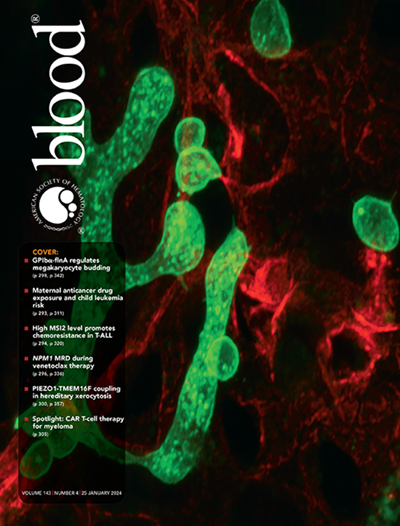High Incidence of Severe TA-TMA Increases Mortality in adult Allogeneic Transplant recipients: A prospective MIDAS Consortium study.
IF 21
1区 医学
Q1 HEMATOLOGY
引用次数: 0
Abstract
No prospective study has evaluated the incidence of TA-TMA in adult allogeneic hematopoietic cell transplant (HCT) recipients. The MIDAS (MIcroangiopathy, endothelial Damage in Adults undergoing Stem cell transplantation) consortium conducted the first multi-center study to prospectively screen for TA-TMA. Longitudinal blood samples and detailed clinical data were collected weekly through day +100 and at months 5, 6, 9 and 12 in first allogeneic HCT recipients at three sites (Ohio State University, Moffitt and Roswell Park Comprehensive Cancer Centers). Adjudication of TA-TMA diagnosis was reviewed in real time by three blinded independent reviewers. Incidence of TA-TMA was scored using 6 published criteria: Harmonization, Jodele, Li, BMT-CTN, IWG and Cho, as well as the center-reported diagnosis and MIDAS adjudication categorized as no TMA, non-severe, or severe TA-TMA. Incidence of severe TA-TMA by day +100 was similar across the three centers at 21.8%, with a median time to onset of 14.5 days in 239 patients. Incidence of non-relapse mortality was 42% in severe compared to 8.4% in non-severe and 5.8% in no TMA groups (p<0.001). Rise in serum creatinine as early as day +7 and occurrence of hypertension by day+14 post-HCT were early indicators of severe TA-TMA. Our prospective study of systematic screening for TA-TMA identifies a higher incidence of a clinically impactful phenotype of TA-TMA than previously reported in adult HCT recipients. Our natural history study provides an essential foundation for urgently needed studies of prophylaxis and treatment of TA-TMA in adults and suggests clinical value in our inexpensive screening strategy.严重TA-TMA的高发病率增加成人同种异体移植受者的死亡率:一项前瞻性MIDAS联盟研究。
没有前瞻性研究评估TA-TMA在成人同种异体造血细胞移植(HCT)受者中的发病率。MIDAS(接受干细胞移植的成人微血管病变,内皮损伤)联盟进行了第一个多中心研究,以前瞻性筛查TA-TMA。在三个地点(俄亥俄州立大学、莫菲特和罗斯威尔公园综合癌症中心)的首次同种异体HCT接受者中,每周收集纵向血液样本和详细的临床数据,直到第100天和第5、6、9和12个月。TA-TMA诊断的判定由三位独立的盲法审稿人实时审查。TA-TMA的发生率采用6个已公布的标准进行评分:Harmonization、Jodele、Li、BMT-CTN、IWG和Cho,以及中心报告的诊断和MIDAS判定分为无TMA、非严重或严重TA-TMA。三个中心的严重TA-TMA在第100天的发生率相似,为21.8%,239例患者的中位发病时间为14.5天。重度组非复发死亡率为42%,非重度组为8.4%,无TMA组为5.8% (p<0.001)。hct后第+7天血清肌酐升高,第+14天出现高血压是严重TA-TMA的早期指标。我们对TA-TMA系统筛查的前瞻性研究发现,TA-TMA临床影响表型在成人HCT受体中的发病率高于先前报道。我们的自然病史研究为迫切需要的成人TA-TMA预防和治疗研究提供了必要的基础,并表明我们的廉价筛查策略具有临床价值。
本文章由计算机程序翻译,如有差异,请以英文原文为准。
求助全文
约1分钟内获得全文
求助全文
来源期刊

Blood
医学-血液学
CiteScore
23.60
自引率
3.90%
发文量
955
审稿时长
1 months
期刊介绍:
Blood, the official journal of the American Society of Hematology, published online and in print, provides an international forum for the publication of original articles describing basic laboratory, translational, and clinical investigations in hematology. Primary research articles will be published under the following scientific categories: Clinical Trials and Observations; Gene Therapy; Hematopoiesis and Stem Cells; Immunobiology and Immunotherapy scope; Myeloid Neoplasia; Lymphoid Neoplasia; Phagocytes, Granulocytes and Myelopoiesis; Platelets and Thrombopoiesis; Red Cells, Iron and Erythropoiesis; Thrombosis and Hemostasis; Transfusion Medicine; Transplantation; and Vascular Biology. Papers can be listed under more than one category as appropriate.
 求助内容:
求助内容: 应助结果提醒方式:
应助结果提醒方式:


